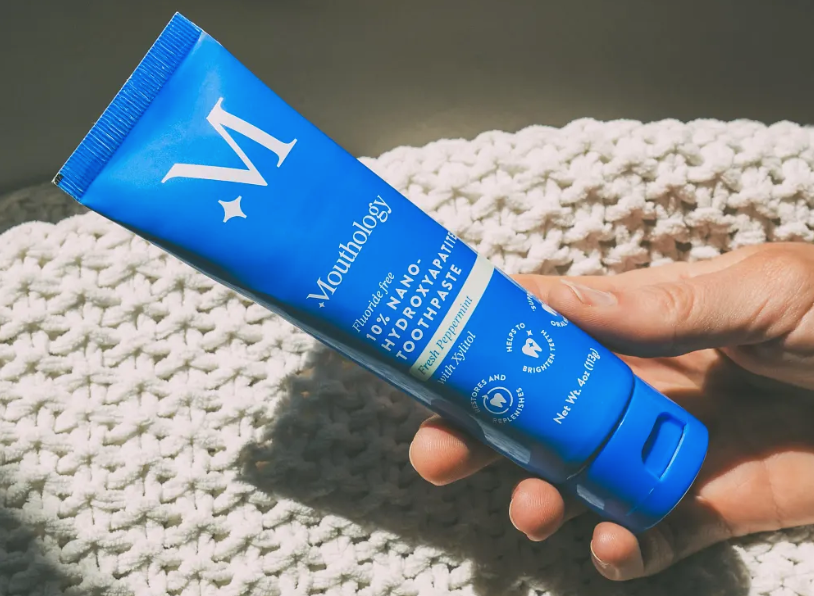Fluoride toothpaste is generally safe and recommended for both children and adults. However, toothpaste contain fluoride should be used in moderation as excessive consumption of fluoride can lead to health issues.
What is Fluoride?
Fluoride is a naturally occurring mineral found in various water sources, soils, and certain foods. It plays a vital role in dental health by helping to prevent tooth decay. Fluoride is also added to many oral care products, such as toothpaste and mouth rinses, due to its beneficial properties.
The key to fluoride's effectiveness lies in its ability to support the remineralization of enamel, making teeth more resistant to acid attacks from plaque bacteria.
However, maintaining appropriate fluoride levels is crucial because excessive amounts of fluoride may cause dental fluorosis, especially in young children. Common compounds used in dental care include sodium fluoride, which is frequently found in toothpaste and professional dental treatments.
Benefits of Fluoride Toothpaste
Being a staple ingredient in toothpaste, fluoride offers numerous benefits for dental health. Some of these include:
Prevents Tooth Decay
One of the primary benefits of using fluoride toothpaste is its remarkable ability to prevent tooth decay. By brushing your teeth with fluoride toothpaste, you actively counteract the harmful effects of plaque bacteria that produce acids responsible for eroding dental enamel.
The use of fluoride toothpaste is vital in maintaining your oral health as it inhibits the demineralization process and encourages the remineralization of your teeth, making them stronger and less prone to cavities. Regularly brushing your teeth with fluoride toothpaste ensures your teeth are protected and decay is kept at bay.
Strengthens Teeth
Fluoride toothpaste plays a significant role in helping to strengthen your teeth. When you use fluoride toothpaste consistently, fluoride ions are incorporated into the outer layer of your teeth, fortifying the enamel.
This enhancement in the enamel's composition makes it more resilient to acid attacks and other factors that contribute to tooth wear and decay. The benefits of using fluoride toothpaste lie in its ability to create a more robust defense system for your teeth, thereby extending their health and functionality over your lifetime.
Reduces Sensitivity
Another advantage of fluoride toothpaste is its capacity to reduce tooth sensitivity. Sensitivity often results from the thinning of enamel or the exposure of dentin due to gum recession.
Brushing your teeth with fluoride toothpaste helps form a protective layer over the exposed areas, thus decreasing sensitivity to hot, cold, or sweet stimuli. The use of fluoride toothpaste is safe for everyday use and can significantly improve your comfort and quality of life by mitigating sensitivity issues.
Cost Effective
Fluoride toothpaste is not only effective but also cost-efficient. Protecting your teeth with fluoride toothpaste is much more affordable compared to extensive dental treatments required to address cavities and other issues resulting from poor oral hygiene. The widespread availability and reasonable pricing of fluoride toothpaste make it accessible for people from different socioeconomic backgrounds.
Additionally, investing in fluoride toothpaste can help prevent costly dental procedures in the future, highlighting the significant benefits of using it as part of your daily dental care routine.
Is There Such Thing as Too Much Fluoride?
As they say, moderation is key, and this holds true for fluoride usage. Excessive fluoride intake can lead to several health problems. Ingesting too much fluoride, whether through dental products or dietary supplements, can result in nausea, vomiting, abdominal pain, diarrhea, bone pain, and, in rare instances, even death.
High levels of fluoride over an extended period can lead to skeletal fluorosis, a serious condition that affects bone structure and strength. Fluoride can be toxic if consumed in large amounts, making it essential to use fluoride toothpaste correctly.
Parents, in particular, should be vigilant if they are concerned about fluoride exposure in young children. Kids are more likely to swallow toothpaste instead of spitting it out, increasing the risk of ingesting harmful amounts of fluoride.
Therefore, it's crucial to supervise children's brushing habits and ensure they use only a pea-sized amount of toothpaste. While fluoride toothpaste offers substantial benefits for maintaining dental health, caution is advised to prevent potential toxicity.
Downsides of Excessive Fluoride Consumption
Now, let's take a look in a detailed way what health issues may arise from excessive fluoride intake:
Tooth Discoloration
One of the risks associated with fluoride is tooth discoloration. Excessive fluoride consumption can cause fluorosis, a condition that results in white spots or streaks on the teeth. These visual signs indicate that too much fluoride has interfered with the normal development of enamel, leading to noticeable discoloration that can be aesthetically unpleasing.
Tooth Decay
While fluoride is beneficial in preventing tooth decay, improper use can have the opposite effect. One of the potential risks of using fluoride improperly is that it can damage the enamel, resulting in decay. When fluoride interferes with enamel formation in young children, it leads to weaker teeth that are more prone to cavities.
Skeletal Weakness
A possible con of fluoride toothpaste is its impact on bone health when consumed in excessive quantities. Chronic high intake of fluoride can lead to skeletal fluorosis, which weakens bones and increases the risk of fractures. Such a condition illustrates how fluoride in toothpaste can be bad for your overall skeletal health.
Neurological Problems
Fluoride exposure is potentially harmful to your health beyond just dental issues. Emerging studies suggest a link between high fluoride levels and neurological problems. These include cognitive deficits and lower IQ scores in children. Parents worried about fluoride should closely monitor their children’s intake to avoid such severe consequences.
High Blood Pressure
High consumption of fluoride might have broader systemic effects, including on cardiovascular health. Some research indicates that overexposure to fluoride could lead to higher blood pressure levels. Fluoride toothpaste, when overused, might be a contributing factor to long-term cardiovascular problems.
Acne
Another lesser-known issue linked to fluoride is skin conditions, such as acne. Consuming high levels of fluoride can lead to inflammatory responses, resulting in skin lesions or acne. Fluoride can irritate skin conditions, raising concerns about its safe use, especially for those with sensitive skin.
Seizures
In extreme scenarios, acute fluoride toxicity can lead to serious health issues like seizures. When fluoride is ingested in very high quantities, it can pass into the bloodstream and cause severe reactions, including convulsions. This underscores the importance of using fluoride toothpaste correctly to mitigate such extreme risks associated with fluoride toxicity.
Alternatives to Fluoride Toothpaste
You might be thinking, "With all these potential risks, is fluoride toothpaste the only option?" The answer is no; there are several alternatives to fluoride toothpaste available in the market. These include:
- Hydroxyapatite Toothpaste: Effective for remineralizing enamel and promoting healthy teeth without the use of fluoride.
- Xylitol Toothpaste: Known for its natural cavity-fighting properties, xylitol can help inhibit the growth of bacteria responsible for tooth decay.
- Charcoal Toothpaste: Utilized for its whitening effect and ability to remove surface stains; however, it should be used cautiously to avoid enamel erosion.
- Neem Toothpaste: Leveraging the antibacterial properties of neem to help maintain oral health and prevent plaque buildup.
- Bentonite Clay Toothpaste: A natural option that can help draw out toxins and maintain a clean mouth environment.
- Baking Soda Toothpaste: Known for its mild abrasive nature that helps in removing surface stains and neutralizing acids in the mouth.
- Herbal Toothpaste: Formulated with natural herbs and essential oils to promote oral health without the use of artificial chemicals or fluoride.
- Tea Tree Oil Toothpaste: Valued for its antiseptic properties, it helps to control bacteria and maintain gum health.
- Coconut Oil Toothpaste: Often combined with other natural ingredients, coconut oil is known for its antibacterial and anti-inflammatory benefits.
Fluoride vs Non-Fluoride Toothpaste: What's the Difference?
When deciding to choose a toothpaste, it's important to consider your specific dental needs and preferences. Fluoride toothpaste contains fluoride, which is widely recognized for its ability to strengthen enamel and prevent cavities. The use of fluoride in toothpaste must be balanced to avoid the risks associated with overexposure.
However, the benefits of fluoride toothpaste are substantial; it can effectively reduce tooth decay and enhance oral health. If you opt for a toothpaste that contains fluoride, ensure it is used according to recommended guidelines, particularly for children.
Adults should also monitor the amount they use to reap the benefits while minimizing potential risks. Always consult with a dental professional to determine the best option for your oral care routine.
When to Choose Fluoride-Free Toothpaste
While they say that everyone should use fluoride toothpaste, there are a few exceptions. People who have an increased risk of developing fluorosis should consider using non-fluoride toothpaste. This includes:
- Children under 2 years old: Children at this age may accidentally swallow too much fluoride; therefore, it's recommended to use a non-fluoride toothpaste.
- Adults with chronic health conditions: Those with kidney disease or diabetes may have difficulty removing excess fluoride from the body, making them more prone to fluorosis.
- Those living in areas with high natural fluoride levels: Certain regions have higher levels of naturally occurring fluoride in their water supply, increasing the risk for fluorosis. In such cases, it might be best to opt for a non-fluoride toothpaste.
- Individuals with allergies or sensitivities: Some people may have adverse reactions to fluoride, such as skin rashes or stomach discomfort. In this case, a non-fluoride alternative would be a more suitable option.
Finding Balance for Good Oral Health
There's no one-size-fits-all answer when it comes to choosing the right toothpaste. While fluoridated toothpaste is widely recommended for its positive effect on tooth enamel and cavity prevention, it's essential to consider individual needs and circumstances. Fluoride can cause issues if overused, and consulting with your dentist can help guide you.
For some, fluoride treatment might still be beneficial, but always balance the advantages with the potential risks to maintain optimal oral health.
Make sure to consult with a dental professional to determine the best course of action for your oral care routine.
Read our blog, "10 Surprising Fluoride-Free Toothpaste Benefits" to know more about this alternative.

